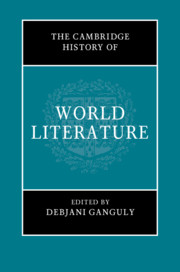Book contents
- The Cambridge History of World Literature
- The Cambridge History of World Literature
- Copyright page
- Contents
- Figures
- Contributors
- Acknowledgements
- Introduction
- Part I Genealogies
- Part II Thinking the World
- Part III Transregional Worlding
- 14 East Asia as Comparative Paradigm
- 15 Latin American Baroque: Or Error by Design
- 16 Comparative World Literature and Worlds in Portuguese
- 17 Africa and World Literature
- 18 Literary Revolution: Ireland and the World
- 19 Korean Worlds and Echoes from the Cold War
- 20 French Colonial Literature in Indochina: Colonial Adventure and Continental Drift
- 21 From Diasporic Tamil Literature to Global Tamil Literature
- Part IV Cartographic Shifts
- Part V World Literature and Translation
- Part VI Poetics, Genre, Intermediality
- Part VII Scales, Polysystems, Canons
- Part VIII Modes of Reading and Circulation
- Part IX The Worldly and the Planetary
- Index
- References
17 - Africa and World Literature
from Part III - Transregional Worlding
Published online by Cambridge University Press: 17 August 2021
- The Cambridge History of World Literature
- The Cambridge History of World Literature
- Copyright page
- Contents
- Figures
- Contributors
- Acknowledgements
- Introduction
- Part I Genealogies
- Part II Thinking the World
- Part III Transregional Worlding
- 14 East Asia as Comparative Paradigm
- 15 Latin American Baroque: Or Error by Design
- 16 Comparative World Literature and Worlds in Portuguese
- 17 Africa and World Literature
- 18 Literary Revolution: Ireland and the World
- 19 Korean Worlds and Echoes from the Cold War
- 20 French Colonial Literature in Indochina: Colonial Adventure and Continental Drift
- 21 From Diasporic Tamil Literature to Global Tamil Literature
- Part IV Cartographic Shifts
- Part V World Literature and Translation
- Part VI Poetics, Genre, Intermediality
- Part VII Scales, Polysystems, Canons
- Part VIII Modes of Reading and Circulation
- Part IX The Worldly and the Planetary
- Index
- References
Summary
World Literature now knows itself as a corpus of peripatetic cultural texts held together by protocols “of circulation and of reading” (Damrosch 4–5), but some accounts of modern literary history in World Literature anthologies impoverish, rather than enrich, students’ understanding of Africa and the worldliness of African cultural texts. To change this, it is necessary to recalibrate the relationship between Africa and World Literature. Rethinking modern literary history, particularly literary modernism, is one way of doing so. Literary modernism was a global, rather than a regional, phenomenon. Globalizing its classics in World Literature anthologies would, therefore, encourage students to read them historically. In practice, this means reading African and Western modernism contrapuntally. Resisting the urge to subsume African cultural texts in pre-established generic categories is another way of doing so. That Son-Jara, Gilgamesh, and The Iliad are epics should not preclude acknowledging that how each produces epicality differs. Admitting that translation cannot overcome all obstacles to mutual intelligibility across languages is an additional way. Some words, some concepts, are simply untranslatable. Such recalibrations open World Literature up to the recognition that Africa and its cultural texts affirmatively intervene in, rather than merely augment, cultural texts of the West.
- Type
- Chapter
- Information
- The Cambridge History of World Literature , pp. 326 - 342Publisher: Cambridge University PressPrint publication year: 2021

